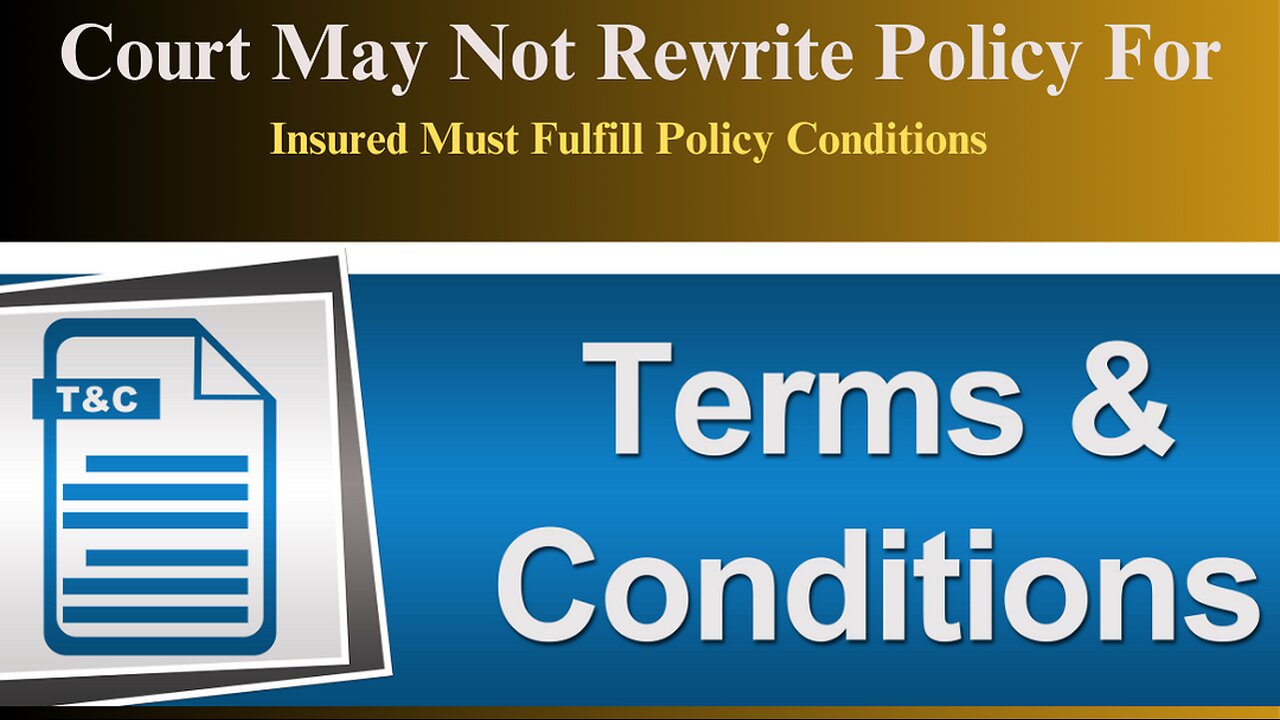Premium Only Content

Court May Not Rewrite Policy
Insured Must Fulfill Policy Conditions
Post 4718
Pharmacia Corporation appealed the District Court's order granting summary judgment declaring that one of its excess insurers, Twin City Fire Insurance Company, did not owe a duty to pay Pharmacia's settlement and defense costs from a shareholder class action.
In Pharmacia Corporation n/k/a Pfizer, Inc. v. Arch Specialty Insurance Company; Twin City Fire Insurance Company; Liberty Mutual Insurance Company, No. 22-2586, United States Court of Appeals, Third Circuit (January 19, 2024) the conditions were applied.
FACTS
Pharmacia, a pharmaceutical drug manufacturer, purchased a $200 million directors and officers insurance tower from thirteen companies through an insurance broker. The first layer of the tower consisted of a $25 million primary policy issued by National Union Fire Insurance Company of Pittsburgh, Pa (the "Primary Policy"). The next twelve policies provided excess insurance totaling $175 million. Twin City sold Pharmacia the eighth-layer excess policy (the "Policy"), which provided $10 million in coverage and specified that "liability for any loss shall attach to [Twin City] only after the Primary and Underlying Excess Insurers shall have [(1)] duly admitted liability and [(2)] . . . paid the full amount of their respective liability."
Pharmacia shareholders sued seeking class action qualification against the company, alleging that it artificially inflated its stock by misrepresenting the results of a clinical drug study. After ten years of litigation, the case settled, and Pharmacia incurred approximately $207 million in defense and indemnity costs. Pharmacia then provided Twin City proof that the excess carriers ahead of it in the insurance tower paid their policy limits and asked Twin City to provide coverage. Twin City declined.
Pharmacia sued Twin City. The District Court granted Twin City's motion for summary judgment and dismissed the case with prejudice. The Court found that: (1) the plain language of the Policy required the other excess insurers to admit liability as a condition precedent for coverage to attach; (2) six of them had disclaimed liability, and (3) as a result, a condition for coverage was not satisfied. Pharmacia appealed.
POLICY INTERPRETATION
The Third Circuit concluded that no conflict exists here. Specifically, courts:
Give effect to the intent of the parties as expressed in the clear language of the contract, and the plain language of the contract is the cornerstone of the interpretive inquiry.
May not make a different or better contract than the parties themselves saw fit to enter into.
Courts should refrain from rewriting the agreement to accomplish their notions of abstract justice or moral obligation.
May avoid a literal construction of the words of a contract only if that interpretation defies all bounds of common sense.
ANALYSIS
When the intent of the parties is plain and the language is clear and unambiguous, a court must enforce the agreement as written, unless doing so would lead to an absurd result.
Applying these principles, the Policy unambiguously imposed two distinct conditions precedent for coverage to attach. Specifically, Pharmacia must show both that the insurers ahead of Twin City in the tower have:
duly admitted liability and
paid the full amount of their respective liability.
Pharmacia failed to show that both conditions to trigger Twin City's coverage were met since six insurers refused to admit liability.
Regardless of whether the other insurers in the tower paid their policy limits, the record does not demonstrate that all of those insurers admitted liability and the court is not required to accept the error of the six insurers refusing to admit liability who still paid. Because Pharmacia failed to establish at least one condition precedent, the District Court correctly declined to declare that Twin City owes Pharmacia coverage. The trial court was affirmed.
ZALMA OPINION
Conditions precedent in an insurance policy must be met or the insurer has no obligation to provide defense or indemnity under the policy. Twin City established that six insurers in Pharmacia's tower below Twin City did not admit liability and that, therefore, it failed to prove compliance with the condition precedent. Pharmacia luckily received contributions from insurers accepting coverage and insurers who did not but decided not to litigate. After reading this case, if the six had the same condition, they have explanations to make to their shareholders.
(c) 2024 Barry Zalma & ClaimSchool, Inc.
Please tell your friends and colleagues about this blog and the videos and let them subscribe to the blog and the videos.
Subscribe to my substack at https://barryzalma.substack.com/publish/post/107007808
Go to Newsbreak.com https://www.newsbreak.com/@c/1653419?s=01
Go to X @bzalma; Go to the podcast Zalma On Insurance at https://podcasters.spotify.com/pod/show/barry-zalma/support; Go to Barry Zalma videos at Rumble.com at https://rumble.com/c/c-262921; Go to Barry Zalma on YouTube- https://www.youtube.com/channel/UCysiZklEtxZsSF9DfC0Expg; Go to the Insurance Claims Library – http://zalma.com/blog/insurance-claims-library.
-
 7:40
7:40
Barry Zalma, Inc. on Insurance Law
1 year agoLoss of Inventory by Bankruptcy
180 -
 LIVE
LIVE
Chicks On The Right
3 hours agoSo..are we at war with Iran now? Reaction to the strikes, and WNBA's new star
3,307 watching -
 LIVE
LIVE
LFA TV
14 hours agoLFA TV ALL DAY STREAM - MONDAY 6/23/25
3,851 watching -
 LIVE
LIVE
The Bubba Army
2 days agoTrump OBLITERATES Iran: What's Next? - Bubba the Love Sponge® Show | 6/23/25
2,540 watching -
 1:59:45
1:59:45
BEK TV
2 hours agoTrent Loos in the Morning 6/23/2025
20K -
 LIVE
LIVE
AP4Liberty
1 hour agoDeath To America? Then No Nukes For You!
266 watching -
 20:58
20:58
GritsGG
18 hours agoFrying a Casual Solos Lobby! Pushing for 50 Kills!
32.5K8 -
 2:16:18
2:16:18
Side Scrollers Podcast
2 days agoCONTENT NUKE GOES LEGAL, AI To REMAKE Classic Movies, Walter Day Interview | Side Scrollers Live
79.7K15 -
 LIVE
LIVE
Lofi Girl
2 years agolofi hip hop radio 📚 - beats to relax/study to
310 watching -
 49:01
49:01
Anthony Pompliano
2 days ago $7.52 earnedBitcoiners Built Tether Into The Most Profitable Company Ever
50.3K8